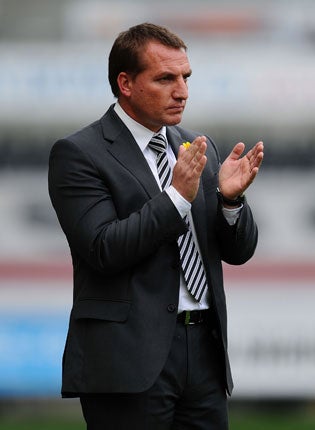Paul Newman: Swansea must not forget their history of ups and downs
The Football League Column:

Your support helps us to tell the story
From reproductive rights to climate change to Big Tech, The Independent is on the ground when the story is developing. Whether it's investigating the financials of Elon Musk's pro-Trump PAC or producing our latest documentary, 'The A Word', which shines a light on the American women fighting for reproductive rights, we know how important it is to parse out the facts from the messaging.
At such a critical moment in US history, we need reporters on the ground. Your donation allows us to keep sending journalists to speak to both sides of the story.
The Independent is trusted by Americans across the entire political spectrum. And unlike many other quality news outlets, we choose not to lock Americans out of our reporting and analysis with paywalls. We believe quality journalism should be available to everyone, paid for by those who can afford it.
Your support makes all the difference.Swansea City fans have been watching their past turn to rubble. Demolition work at the club's historic Vetch Field ground, where the Swans last played six years ago, began in February. Swansea Council are pulling down the stadium and landscaping the site in the hope of making it more attractive to investors.
Less than three miles to the north of the Vetch, however, Brendan Rodgers has been building a new era in the club's history at the Liberty Stadium, which the footballers share with the Ospreys rugby union team. After last week's battling draw away to Nottingham Forest in the first leg of their Championship play-off semi-final, Rodgers' team could be just two matches away from the Premier League.
Promotion would cap nine years of progress. It was during the 2002-03 season that the Swans went bottom of the Football League for the first time in their history. A turbulent season, in which 21 players made their debuts for the club, saw Brian Flynn's side avoid dropping into the Conference by winning their last match of the campaign at home to Hull City.
Two seasons later, however, Kenny Jackett's team secured promotion as the club bade farewell to the Vetch Field, their home for the previous 93 years. Three years on and Swansea were crowned League One champions after Roberto Martinez's first full season in charge. Martinez moved to Wigan in 2009 following the club's first season back in the Championship – they finished a respectable eighth – and the team ended the next campaign one place higher 12 months later under Paulo Sousa.
Rodgers, who had enjoyed mixed fortunes in charge of Watford and Reading, took over last summer. With nine wins in their first 14 matches, Swansea were among the pacemakers from the start of the current campaign. They finished the regular season with three successive victories, scoring 10 goals in the process, and, after a goalless draw last week at Forest, where they had a player sent off in the first minute, will be the favourites to go through at the end of tonight's second leg.
If the Swans' progress since the turn of the century has been steady rather than spectacular, their fans would probably prefer it that way, given the club's history. A previous Swansea team made a more giddy ascent in the late 1970s and early 1980s, but their fall was just as dramatic.
When John Toshack took over as player-manager in 1978, Swansea were in the old Fourth Division. During his six years at the helm, the former Liverpool striker successfully welded together a blend of local talent – men like Alan Curtis, Leighton James, Robbie James, Jeremy Charles and David Giles – and experienced campaigners, returning to Merseyside to recruit the likes of Tommy Smith, Ian Callaghan, Colin Irwin and Bob Latchford.
Within 18 months of Toshack's arrival, Swansea were playing in what is now the Championship after two successive promotions. Two years later, in 1981, the Swans were in the top flight after their third promotion in four years. Toshack's men went on to take the old First Division by storm, led the table and were in contention to win the championship until the closing weeks, eventually finishing sixth.
The dream faded quickly, however, as Swansea were relegated the following season. Toshack left, a second successive relegation followed and a third was avoided thanks only to a draw at Bristol City in the last game. The price of previous success became apparent the following season when the club was wound up in the High Court in December 1985.
Lengthy legal battles followed and for 12 months they were not allowed to sign any players. Nevertheless, the Football League allowed a group of directors to take charge and Swansea were able to complete their fixtures. They were relegated to the old Fourth Division in 1986, completing an extraordinary journey from the bottom of the pile to the top and back again in the space of just eight years.
Join our commenting forum
Join thought-provoking conversations, follow other Independent readers and see their replies
Comments